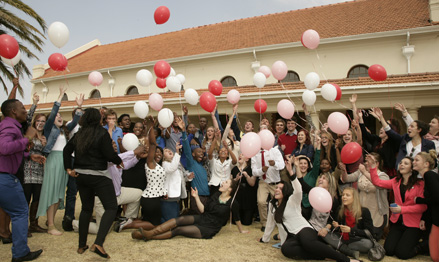Latest News Archive
Please select Category, Year, and then Month to display items
27 October 2025
|
Story Sefako Mokhosoa
|
Photo Supplied
 Ten Grade 12 learners from Mampoi Secondary School in Phuthaditjhaba.
Ten Grade 12 learners from Mampoi Secondary School in Phuthaditjhaba.
On 1 October 2025, the Projects and Innovation Directorate in the Faculty of Education at the University of the Free State (UFS) proudly hosted a certificate ceremony to honour ten Grade 12 learners from Mampoi Secondary School in Phuthaditjhaba on the Qwaqwa Campus. These learners completed a Skills Development Initiative and Workshop Series focused on digital literacy and ICT skills – a programme designed to equip rural youth with the tools they need to thrive in a digital world.
The initiative, which ran from May to August 2025, was made possible through a strategic partnership with BANKSETA to bridge the digital divide in rural communities. The learners received hands-on training in essential digital tools. Each learner also received a tablet to support continued learning and personal growth beyond the classroom.
The Director of the office in the Faculty of Education, Dr Kwazi Magwenzi, stressed that digital skills promote independence and self-directed learning. “Grade 12 is a time when learners should manage their studies, meet deadlines, and explore their options,” she said. “Digital fluency supports that autonomy. It enables learners to use online research, interactive tools, e-learning, and collaboration platforms to make learning more effective, flexible, and aligned with their pace and style. In Grade 12, where the stakes are high – with exams, tertiary entrance, and career choices – this ability helps learners become more self-directed, confident, and equipped.”
The programme not only built learners’ confidence in using ICT tools for learning and communication but also prepared them for the technologically driven environments they will encounter in institutions of higher learning.
Beyond developing digital skills, the project offered learners valuable exposure to the university environment, as their training took place on campus. Inspired by the success of this pilot, the Faculty of Education now aims to expand the initiative to reach more schools and learners across the region. The vision is to scale up access to digital education and empower more young people in rural areas with the skills necessary for academic and professional success.
This ceremony marked the conclusion of a successful training programme and the beginning of a long-term commitment to digital empowerment and lifelong learning in rural communities.
‘Your capacity for change is limitless’
2013-09-13
|
 |
Ready for the world - students taking part in the 2013 Leadership for Change programme getting ready to travel to universities in the USA, Europe and Asia.
Photo: Johan Roux
12 September 2013 |
“You will change this campus, city, country, continent and the world, because you have the capacity for greatness,” Prof Jonathan Jansen, Vice-Chancellor and Rector of the University of the Free State (UFS), said.
He addressed the 2013 group of first-year students in the Leadership for Change programme at a farewell function before they will leave for universities abroad. The first 104 students from the 2013 total of 144 will depart on 18 September and return on 3 October 2013. The second group of 40 students will be abroad from 11 to 25 January 2014. The students are from the Bloemfontein and Qwaqwa Campuses. They will be accompanied by mentors from the UFS.
The students will visit 17 universities in the USA, Europe and Asia.
The first 71 first-year students in the Leadership for Change programme were sent abroad for two weeks in September 2010 to get intense exposure to the academic, social, cultural and residential lives of students in the USA. In 2011 the student number more than doubled and universities in Europe were included. In July 2012 the programme brought students from around the globe to the UFS for the Global Leadership Summit.
Prof Jansen inspired the young leaders, saying, “If you learn leadership values in your four years of study, a change will come. Build the new value system and take it into the country. Your capacity for change is limitless.”
He encouraged them to learn to know the stranger, not only abroad, but also the beggar at the street corner. “Learn to be comfortable with the beggar, as well as with the professor in the classroom.”
A stringent evaluation and training programme preceded the group’s visit abroad, and Prof Jansen could not formulate their achievement better: “I cannot tell you how proud I am of you.”